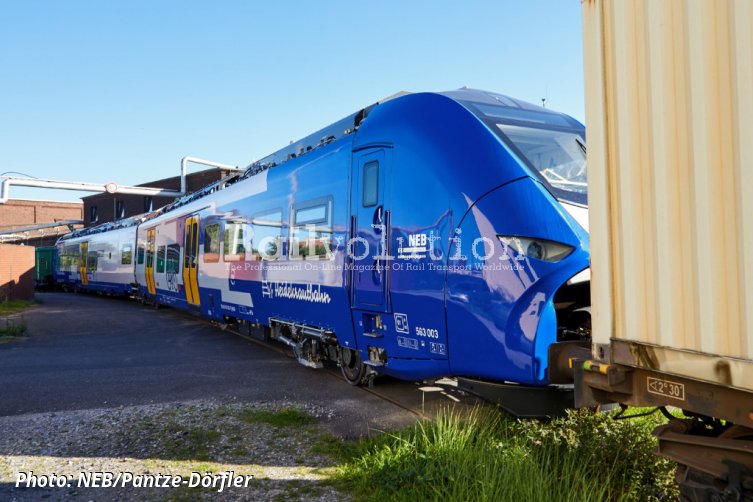All Mireo Plus H trains for NEB have arrived at the PCW
posted on 8th Dec 2023 11:56
Siemens Mobility has built seven two-car Mireo Plus H trains for Niederbarnimer Eisenbahn (NEB). The last HMU in the batch left the Krefeld factory on 30 October 2023 and was transferred to the Siemens Mobility test center in Wegberg-Wildenrath.
Following the basic electrical and mechanical functions tested at Krefeld, further in-depth tests are now being carried out at the PCW. The extensive type tests being conducted here include electromagnetic compatibility and brake tests. As these tests, required for official approval of the trains and their operational stability, are conducted, the new trains will be prepared step by step statically and dynamically for operation and ultimately drive their first meters on their own. Final approval by the relevant rail authorities, including the European Union Agency for Railways (ERA) and the German Federal Railway Authority (EBA), will be granted only when all of these tests have been successfully completed.
In addition, NEB’s train drivers will be trained on the Mireo Plus H at the Siemens Mobility test center starting in mid-2024 to ensure that the company’s operating personnel is ready for deployment on the Heidekrautbahn as of December 2024.
The manufacturer was commissioned by NEB in 2022 to deliver seven two-car Mireo Plus H trains for the Heidekrautbahn network in the Berlin-Brandenburg metropolitan region. This marked the first batch order at Siemens Mobility for a fleet using hydrogen technology. Progress is also being made on the order for 31 Mireo Plus B trains for the East Brandenburg network: the first battery-powered train is scheduled to leave Krefeld in the new year and will also be transferred to the Wegberrg-Wildenrath center for final testing.
The use of hydrogen-powered trains on the Heidekrautbahn is part of a scientifically supported joint pilot project funded by the federal government and the states of Berlin and Brandenburg. The project is focused on setting up a regional, sustainable hydrogen infrastructure that also includes a hybrid power plant and a hydrogen storage facility. The Heidekrautbahn will be the first rail network in the Berlin-Brandenburg region operating HMUs for public transport. Ultimately, all services on the RB27 route will be carried out exclusively with green energy – renewable and regionally produced. The switch from diesel fuel to hydrogen on the Heidekrautbahn will reduce annual CO2 emissions by around 3 million kg and save 1.1 million liters of diesel.
The partners have created a joint website with information about the hydrogen project, its stakeholders, and updates on the progress being made:
www.wasserstoffschiene-heidekrautbahn.de.
The project “Use of hydrogen fuel cell drives in local transport in the Barnim district” is funded by the Federal Ministry for Digitalization and Transport as part of the National Innovation Program for Hydrogen and Fuel Cell Technology. The funding guideline is coordinated by NOW GmbH and implemented by lead partner Jülich.
NEB provides local rail passenger mobility in the Berlin-Brandenburg region. The roots of the more than 120-year-old traditional company lie in the region and are at the same time both aspiration and motivation for ensuring environmentally friendly connections between cities and rural areas. NEB owns and operates the Heidekrautbahn network to the north of Berlin and plans to reactivate the Heidekrautbahn mainline (RB28) by 2024.
As a railway company, NEB Betriebsgesellschaft mbH operates eleven regional railway lines in the north and east of Brandenburg on behalf of the Verkehrsverbund Berlin-Brandenburg (VBB). In 2021, Niederbarnimer Eisenbahn was again awarded the contract to operate the Ostbrandenburg network (NOB2) until 2036 and the Heidekrautbahn network until 2034.

